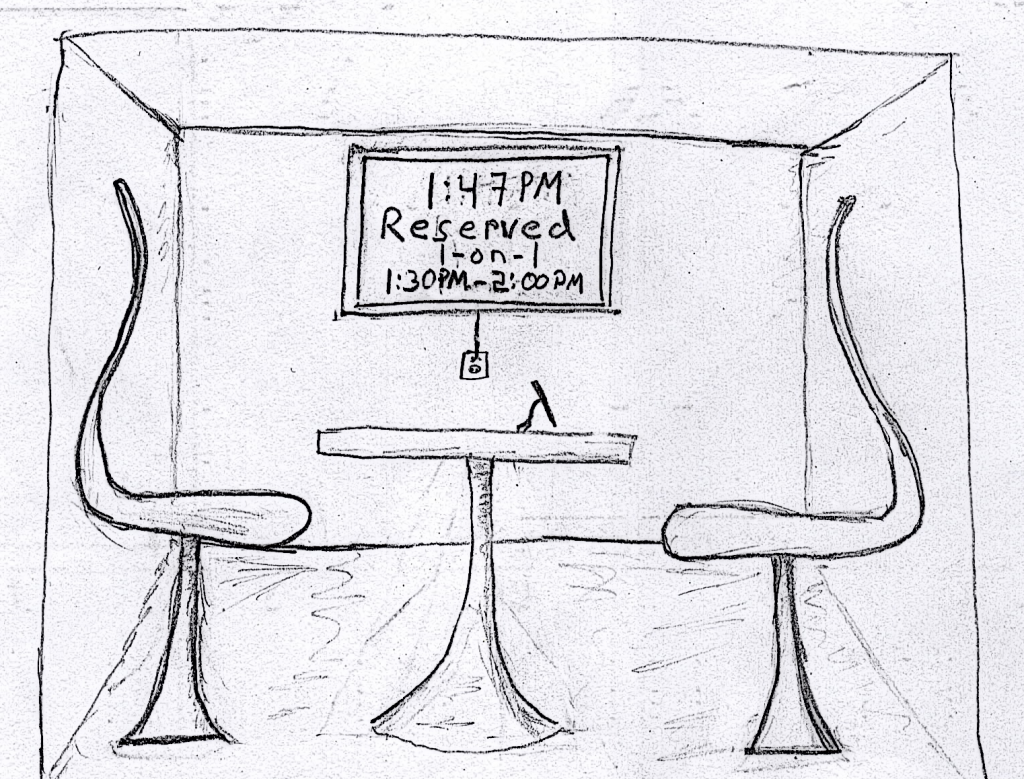
Empty chairs at empty tables..
There is no time like the present to meet with your manager to set expectations. Ideally, this is within your first couple of days on the job or moving to a new manager. Every manager is different and what they value could be very different from your previous experience or assumptions. One manager might value story point velocity and another manager might value clean code. Those standards are not mutually exclusive, but how you measure them are. Go in with questions and your own opinion.
Keep in mind, many engineering managers are engineers first and managers second. They may have had some training on people management, but perhaps not.
Bonus: If you are looking for a job, you might find these topics useful in forming questions for potential employers!
Here are some questions to ask:
How do you measure success for a person in my role?
If your engineering group has a career ladder, this would be a great time to take it out and review it before your meeting. The ladder was written by actual humans, so feel free to ask questions on anything that does not make sense. You should understand how your manager measures success from multiple angles including code, design, communication and productivity.
Do not talk about career advancement in the first meeting. This first meeting is the time to understand the present. However, establish goals in your next one on one and measure them regularly!
What is my team’s mission and priorities and when do you expect us to complete them?
Knowing the team you are joining and how your manager views the team gives you an advantage. Most folks assume they understand the team mission, but when it comes to prioritization, work becomes hazy.
Let’s say your team works on Feature X and Feature Y and one is starting to slip, which feature should the team focus on? Is the date for Feature X soft while the date for Feature Y gets attention from your manager’s boss? Another scenario to clarify would be bugs and production issues and knowing when your manager wants to be involved in the process.
How will I play a role on the team?
This is your differentiator. Allow your manager an opportunity to brainstorm a skill that might be lacking on the team that you could fill. Perhaps it is a specific role like scrum master or production support. Even small process roles can give you a chance to shine. Is the team always late for stand-up? You can be the first one to stand up and get folks to the room. Do refinements get stuck on items? You could keep time and help the scrum master track the number of points refined in a session. Does the team know how their features are being used? You could write queries after each feature release to track success.
There is always an opportunity to set yourself apart.
Do you have any suggestions for how I should work with certain members of the team?
At first glance, this might seem like an odd question. If your manager gives you an odd look, be clear about your intention that you aren’t looking for dirt! Perhaps team-member Jane is remote and in a different time zone. Maybe Julio is really respectful of his lunch hour and doesn’t like meetings at that time.
Knowing these personal nuances early can save you a lot of trouble over finding them out on your own. People have quirks, and it is helpful to know about them.
What are your expectations for..
This is the opportunity to avoid your manager’s pet peeves. Your company should have clear guidelines around topics such as work hours, working from home, vacation etc. You want to understand your manager’s philosophy around these topics. What lead time does your manager expect when requesting vacation or to work from home? Are there certain days that should be avoided to accommodate team rituals?
This is also a good time to establish your work/life boundaries. Maybe your commute makes it difficult to get in on Wednesdays. Or your kids are in baseball in the spring so your schedule goes off the rails for a couple of months.
Hint: Let me be clear. This is not the time to ask for privileges outside the norm of the team or company like working from home three days a week or working a four day work week. While those privileges could come down the line, you might want to work those into goals with your manager over time.
What do you do for fun?
Small talk can drive some engineers crazy. But, life is full. Knowing hobbies, sports, family etc. will give you a deeper understanding of how your manager operates as a person. Asking how kids did in a soccer game or how your manager did in the Brazilian Jiu Jitsu match is far more interesting than the usual “how was your weekend?”
Knowing each other personally will also give you a better understanding of their stress. Giving someone a hand on a bad day can go a long way for them and make you feel good. If that someone happens to your manager, even better!
How often do we meet?
Finally, and most importantly, set up your one on ones! Weekly is ideal, but no less than once a month. You own your career and you own the value received from one on ones. Take them seriously and your manager will find them just as valuable!
What other questions have you found helpful to ask your manager early on?


